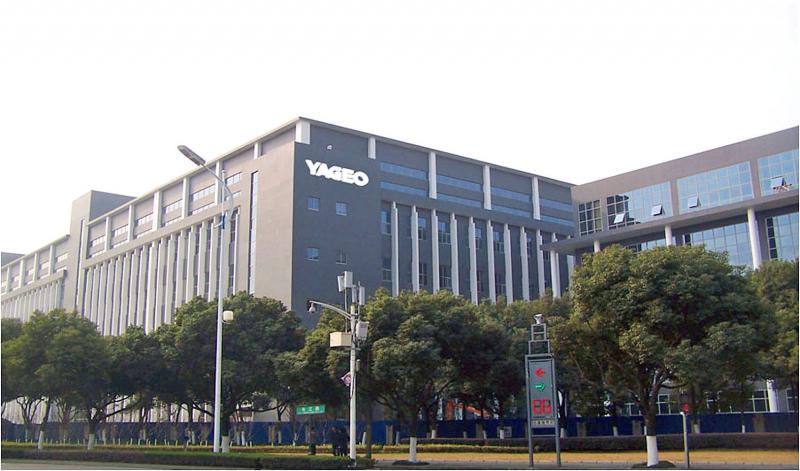Yageo Corp (國巨), a maker of passive components, yesterday reported consolidated revenue of NT$10.53 billion (US$356.78 million) for last month, up 3.8 percent month-on-month and 14.4 percent year-on-year, amid stable demand from major customers and an easing of COVID-19 lockdowns in China’s Kunshan and Shanghai, the company said in a statement.
Yageo’s products include multilayer ceramic capacitors (MLCCs), tantalum capacitors and chip resistors.
It is the world’s third-largest supplier of MLCCs.

Photo: Chang Hui-wen, Taipei Times
Last month’s sales were the highest for May in the company’s history, Yageo data showed.
The company said it remained cautiously optimistic about its sales outlook after Kunshan and Shanghai eased their lockdowns, which had allowed its customers to resume operations and restart shipments.
“Overall, the production and operations of the company’s plants in China remain normal,” Yageo said.
In the first five months of this year, cumulative revenue reached NT$50.8 billion, an annual increase of 21.1 percent, it said.
Separately, Airtac International Group (亞德客), a supplier of pneumatic components, reported consolidated revenue of NT$2.65 billion for last month, up 17 percent from a month earlier, and 18.6 percent from a year earlier as most cities in China gradually relaxed pandemic regulations.
Airtac’s products are used in the production of electronic equipment, general machinery, packaging, automotive devices, batteries, construction equipment and machine tools.
Shipments for the battery, automotive, energy, lighting equipment and electronics industries posted higher growth rates last month, the company said in a regulatory filing.
“As we predicted, the adverse impact of the disease controls on shipments is a short-term phenomenon, and demand has merely been deferred to the coming weeks,” Airtac said. “Current orders are still higher than shipments ... so the company is maintaining its 110 percent utilization rate to increase inventory to meet demand.”
Combined revenue from January to last month grew 7.8 percent year-on-year to NT$11.42 billion, it said.
Meanwhile, BizLink Holding Inc (貿聯控股) on Monday reported that consolidated revenue surged 90.34 percent year-on-year last month to US$157.82 million, the highest monthly sales in the company’s history as customers started to stock up after supply chains gradually returned to pre-lockdown levels.
“Our Kunshan facility [last month] fully resumed normal operations, ramped up production and restarted shipments to customers to catch up on the volume impact from the April lockdown,” Silicon Valley-headquartered BizLink, the sole supplier of wiring harnesses for battery management systems in Tesla Inc’s electric vehicles, said in a statement.
The company’s product portfolio includes components for information technology, consumer electronics and electrical appliances, as well as industrial, automotive, medical, solar and telecom equipment.
Shipments of components used in industrial equipment rose last month due to inventory buildup at its customers, while those for automotive devices and information technology applications showed a steady recovery in shipments, BizLink said.
However, shipments of products used in electrical appliances slowed due to component shortages and longer lead times, while its new German business unit INBG reported weak shipments of telecommunication products for the same reason, BizLink said.
It completed the acquisition of industrial solutions unit INBG from Leoni AG in January, which accounted for 39 percent of its total sales last month, it said.
Combined sales in the first five months increased 89.41 percent year-on-year to US$721.98 million, BizLink said.

To many, Tatu City on the outskirts of Nairobi looks like a success. The first city entirely built by a private company to be operational in east Africa, with about 25,000 people living and working there, it accounts for about two-thirds of all foreign investment in Kenya. Its low-tax status has attracted more than 100 businesses including Heineken, coffee brand Dormans, and the biggest call-center and cold-chain transport firms in the region. However, to some local politicians, Tatu City has looked more like a target for extortion. A parade of governors have demanded land worth millions of dollars in exchange

Taiwan Semiconductor Manufacturing Co’s (TSMC, 台積電) revenue jumped 48 percent last month, underscoring how electronics firms scrambled to acquire essential components before global tariffs took effect. The main chipmaker for Apple Inc and Nvidia Corp reported monthly sales of NT$349.6 billion (US$11.6 billion). That compares with the average analysts’ estimate for a 38 percent rise in second-quarter revenue. US President Donald Trump’s trade war is prompting economists to retool GDP forecasts worldwide, casting doubt over the outlook for everything from iPhone demand to computing and datacenter construction. However, TSMC — a barometer for global tech spending given its central role in the

An Indonesian animated movie is smashing regional box office records and could be set for wider success as it prepares to open beyond the Southeast Asian archipelago’s silver screens. Jumbo — a film based on the adventures of main character, Don, a large orphaned Indonesian boy facing bullying at school — last month became the highest-grossing Southeast Asian animated film, raking in more than US$8 million. Released at the end of March to coincide with the Eid holidays after the Islamic fasting month of Ramadan, the movie has hit 8 million ticket sales, the third-highest in Indonesian cinema history, Film

Alchip Technologies Ltd (世芯), an application-specific integrated circuit (ASIC) designer specializing in server chips, expects revenue to decline this year due to sagging demand for 5-nanometer artificial intelligence (AI) chips from a North America-based major customer, a company executive said yesterday. That would be the first contraction in revenue for Alchip as it has been enjoying strong revenue growth over the past few years, benefiting from cloud-service providers’ moves to reduce dependence on Nvidia Corp’s expensive AI chips by building their own AI accelerator by outsourcing chip design. The 5-nanometer chip was supposed to be a new growth engine as the lifecycle